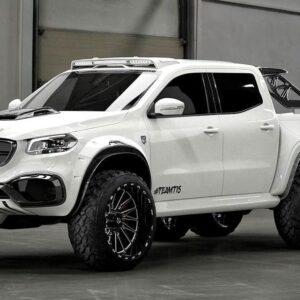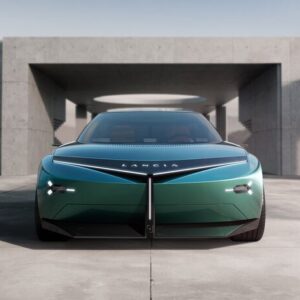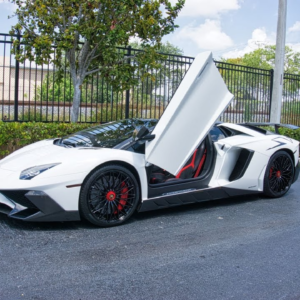In 2006, the same year the Audi R8 arrived, Tom Dickson uploaded a YouTube video that asked the world a simple question: “Will it blend?” In 2012, the year of the first Audi R8 GT, Autocar’s Steve Sutcliffe uploaded a YouTube video that asked the world a related and just-as-simple question about cars instead of kitchen appliances: “Will it drift?”
The Audi R8’s answer to Dickson’s question has always been, “Definitely not,” because it won’t fit in the blender. The R8’s answer to Sutcliffe’s question has always been, “Yes, but….”
The ”but” refers to the R8’s Quattro all-wheel drive. It resisted attempts to go Tenacious D until the driver turned off stability control, even the rear drive R8s of late refusing to get lurid with ESC on. Would-be drifters dancing with mid-engined physics and no safety net found they needed feline deftness on the pedals to sustain high angles of attack. Now we have the 2023 R8 V10 GT RWD, and it brings a new answer to Sutcliffe’s drift question: “Hell yes. With seven levels. And ESC.”
This is the last special edition to come from the Böllinger Höfe factory that builds the R8. Sometime soon, Audi will retire this silken audacity with the majestic handling, and we will be properly sad. Until then, engineers wanted to do something special. What’s a record label’s go-to move when its star artist has made all the music that matters and puts down the guitar? A greatest hits album with all the high notes plus a bonus track. For the Led Zeppelin fans out there, this is the R8’s Mothership. If you prefer this side of the millennium border, it’s The Best of One Direction.
Product planners procured the GT badge from the vault, recalling the first and only R8 GT’s priority on more power, lower weight, and increased agility.

Starting with the R8 V10 Performance RWD we drove almost exactly a year ago, Audi upped the V10’s output to match that of the R8 V10 Performance Quattro at 602 horsepower and 413 pound-feet of torque. That’s 40 more horses and 7 more pound-feet than the regular rear-wheel-drive coupe, and puts the brand’s most powerful engine in a pusher chassis, a first for the R8.
New 20-inch, 10-spoke forged wheels cut more than 20 pounds off the curb weight, the carbon brakes shed another 27.6 pounds, the aluminum and carbon front anti-roll bar scythes off 4.4 pounds. Heaps of Alcantara in the cabin and a touch less sound deadening play their weight-saving parts. Audi says the US-spec curb weight parks 3,516 pounds on gravity’s doorstep, 55 pounds less than the standard R8 V10 RWD.
The upgraded carbon fiber aero kit includes a larger front splitter, larger side sills, additional flicks on the leading corners, vertical aero planes on the rear fenders, and that rear wing with the gooseneck supports.

Black logos adorn the exterior, the final never-done-before gesture being to paint the V10’s intake manifold black instead of gray.
Then, for our market, Audi USA made every option bar one standard equipment. That means Audi Laser Light headlights, the Carbon Fiber front sway bar, the Dynamic Package, Dynamic Steering, the Sport Exhaust, and red brake calipers outside. The interior gussies up with the Premium Package, the Carbon Interior Package, Diamond Stitch full leather, and contrast stitching. The only thing left out is the Full Leather interior, because leather is heavy.
Comparing this model to the first GT from ten years ago, the 2023 version makes 42 more horsepower and 15 more pound-feet, weighs 67 pounds less (the first GT was Quattro), and doubles the maximum downforce to 661 pounds at the R8’s top speed of 199 miles per hour. The blitz to 62 miles per hour takes 3.4 seconds, 0.2 second faster than the 2012 R8 GT and the current R8 V10 RWD.
That would have been more than enough for a V10-powered sendoff. Audi will mint only 333 units of the 2023 R8 GT RWD, the same number as the first R8 GT. Of that, 150 are coming to the U.S. They will be sold out by the time you finish this review. Furthermore, the R8 has been so good for so long we suspected there were no more rabbits to pull from the Bavarian hat.
But the R8 couldn’t drift – at least, not in the computer-aided way popularized of late by so-called Drift Modes. Now it can.

Press the Drive Select button under the left steering wheel spoke. A dial appears in the left corner of the digital gauge cluster with the words “Torque Rear” and seven hash marks. In drifting terms, each mark represents an increase in allowable slip angle – how far you can swing the back out and hold it there.
In the mathematical terms used by the system, each hash mark represents the maximum rear wheel speed as a percentage above forward speed. Say you hit the drift pad doing about 22 miles per hour. In setting 1, the system allows the rear wheels to spin 20 percent faster than the fronts, or at roughly 26 mph. In setting 5, the system permits 52 percent more wheelspin out back, the rear wheels able to turn at 33 mph. Cranked to 7, the system allows 67 percent more wheelspin, about 37 mph. Faster rear wheelspin means more slip.

The percentages decrease as forward speed increases. When driving 45 mph, setting 1 only permits 5 percent more wheelspin, setting 7 permits 34 percent more. At 112 mph of forward velocity, all the settings converge and only 4 percent more rear wheel speed is allowed. The math equations have the same effect as capping slip angle in each of the seven settings, but with a narrowly flexible cap as opposed to a hard cap.
If Iron Man needs to do some sliding at 150 mph for the next MCU tentpole, he’ll have to turn off ESC and make sure his arc reactor is fully charged. He’ll need all his reflexes.
The mechanical limited-slip differential on the rear axle doesn’t take software commands, so in settings 1 to 3 the system uses the front brake activation and throttle cutouts to enforce slip angle limits. From 4 through 7, only throttle cutouts are used.

Audi set up a drift course at the Montalbanco track outside Seville, Spain to give us a trial. What we learned is that the system makes drifting easier, not easy. Get the pedal play right, even for a moment, and each setting’s boundaries are immediately clear, the tail coming around progressively to match those hash marks.
Push the car beyond a setting’s mathematical walls and ESC kicks in to straighten the car out. This is really only possible in the low settings, though. Even at 35 miles per hour, bad footwork in setting 7 has the tail doing a 180 before ESC can pull the plug.
We got six more laps of a compact, kinked-up track, but it rained again just as we pulled out of the pits, and Audi didn’t give us time with the car on public roads. Ah well. We drove the base car a year ago, we know how good it is.

Back-Wheel Bad News
The 2023 Audi R8 V10 GT RWD will start at $249,900 in the US, then charge $1,495 for destination and $1,300 for the gaz guzzler tax. The subtotal comes to $252,695. Only three colors will be offered, Daytona Gray, Mythos Black, and Tango Red.
Or rather, three colors were offered – it’s certain these are sold out. We’re not wistful about it, though. The production R8 V10 RWD continues and can be optioned from the factory respectably close to the GT. Even without a programmed Drift Mode, not only do we find the series production car just as sweet, but it gives us a reason to go for a bunch of spins – sideways and in smoky circles – on a quest for footwork of feline deftness.





